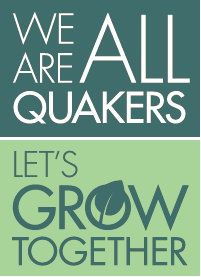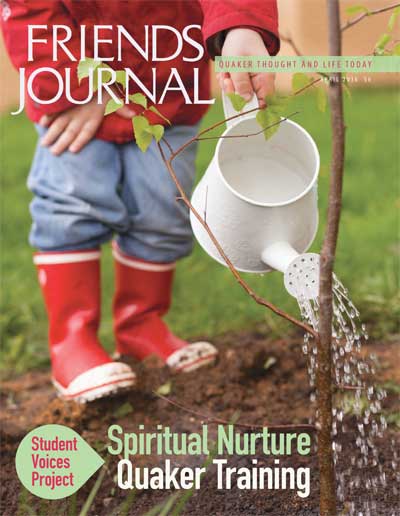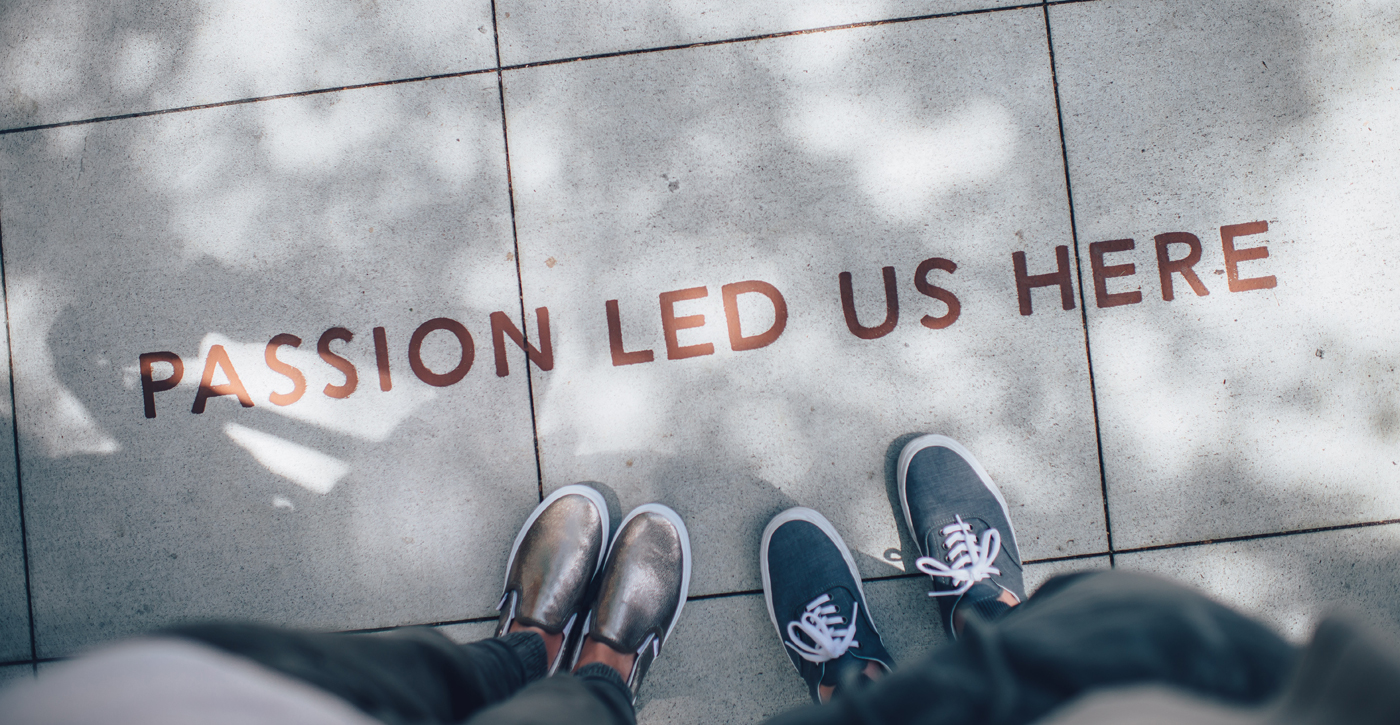
 Anicka Meyers is living in Portland, Ore., where she is currently working on a degree to become a psychiatric mental health nurse practitioner. She is also on staff at Outside In, an organization that serves homeless youth and those in need of medical assistance. She is currently worshiping at Multnomah Meeting and West Hills Friends, both in Portland. Anicka was a 2013-2014 Quaker Voluntary Service (QVS) fellow in Portland and has been living there since. She is originally from Indiana and attended Earlham College.
Anicka Meyers is living in Portland, Ore., where she is currently working on a degree to become a psychiatric mental health nurse practitioner. She is also on staff at Outside In, an organization that serves homeless youth and those in need of medical assistance. She is currently worshiping at Multnomah Meeting and West Hills Friends, both in Portland. Anicka was a 2013-2014 Quaker Voluntary Service (QVS) fellow in Portland and has been living there since. She is originally from Indiana and attended Earlham College.
What were your early experiences of faith, and how did you come to Quakerism?
I grew up Mennonite in Goshen, Ind., where there is one of the few Mennonite colleges in the country and a pretty significant Mennonite community. My parents went to Goshen College; my siblings went there; many family members including my grandfather and great-grandfather have taught at Goshen; and my dad still works there. I grew up going to the Mennonite church on campus, and we were very connected to that community. It’s both a faith and cultural background. There’s definitely a culture around Mennonites and anabaptism.
Then, I was faced with the decision of where to go to college. Most of my life I thought that I would follow in the footsteps of everyone else in my family and go to Goshen College as well, but I didn’t. I ended up going to Earlham College instead. That felt like a big decision at the time, but part of what made not going to Goshen easier was that Earlham is still in Indiana, a three-hour drive away from home. It’s also a small liberal arts college, but a big part of it for me was that it’s Quaker. That was my first real exposure to Quakerism: thinking about Earlham and choosing Earlham.
When did you become a Quaker, if you do consider yourself a Quaker?
I think I do consider myself a Quaker. Before I knew that I liked Quakerism and that it fit me, I really got to put Quakerism into practice and see what that meant to me during my time in QVS. It felt like there were things about Quakerism that I had been missing in my previous experience with spiritual practice, and from my experience of my Mennonite community. I’ve been trying to figure out how I want a spiritual practice in my life, and I finally feel like I am figuring that out.
I’m to the point where my identity as a Quaker feels more present to me than my identity as a Mennonite, which was so strong. I’ll never lose my cultural background and connection to the Mennonite community. That’s something that will continue to be with me, and will influence how I think of myself within Quakerism. At a certain point during my year, I was starting to think, maybe I am a Quaker and what does that mean for me? It feels like in saying that I identify as a Quaker, I am rejecting some of the parts of the rest of my life, like the Mennonite parts of myself. I don’t want to lose that part of myself, and at the same time I feel way more connected to the Quaker community. The easy answer is yes, I am a Quaker. The longer answer is that it is still something that I think about.
What keeps you coming back?
I come to that question from a limited view because I’ve only been a practicing Quaker in Portland. My community in Portland includes a lot of the people that were really involved in my QVS year. I really felt supported by them, and I saw great examples of living Quakerism. That community is what keeps me coming back to Quakerism and was also part of my decision to stay in Portland. That’s also something that was really important to me in my Mennonite background, that aspect of community.
There is also meeting. There are times when I have all of this homework, and it would be great to sleep in. And there are times when I do; I’m not going to lie about that. But I don’t ever regret spending that time in meeting, and that’s something that I carry and think about. I have also found myself telling a lot of people about Quakerism. There aren’t a lot of people in my life outside of Portland who know about Quakerism. I’ve also been telling folks at the nursing program about how I go to meeting, how I work with the high schoolers. It’s great to share what I find meaningful in Quakerism with people who are genuinely interested.
How do you experience meeting for worship?
I go back and forth between two meetings. West Hills Friends is programmed, and Multnomah Meeting is unprogrammed. I more regularly attend Multnomah, and that has a lot to do with my work with the Junior Friends. But during my QVS year I mainly attended West Hills, and that community was really good for me.
I’ll start with my experience of unprogrammed meeting for worship. I sometimes think about the fact that before I came to Quakerism, I never spent time in the presence of so many other people not saying anything. It continues to be an incredible thing to me: to be in the presence of others and experiencing silence together. I used to struggle with unprogrammed meeting, and I don’t feel that way anymore. Part of that is my own development in how to be in meeting. I love that time together, being in the presence of others and hearing what people feel lead to speak.
As for programmed meeting, the reason that I chose to attend West Hills during QVS was because I was coming from a life of church-going. Programmed meeting felt like the right fit or the right transition. It still does feel great to be in programmed meeting. Part of that is that I love singing; it was a huge part of growing up and my worship experience. There is also the group participation in worship, whether that is through singing or at West Hills there is also a time for sharing of joys and concerns. Also there is an opportunity to feel a little bit more led in silent worship. It’s amazing to hear what the pastor, Mike Huber, has to say and then to have that as a guide for my own silent worship. It feels different than unprogrammed meeting. I wouldn’t say that one is better than the other but that it feels different, and that is something I appreciate.
Where are you worshiping now and how are you involved?
I worship mostly at Multnomah. A big part of that is I work with the high school-aged folks from our meeting. Willa Keegan-Rodewald and I are the co-coordinators of what they call the Junior Friends program. We are with them every other Sunday during meeting for worship and for various other gatherings. As co-coordinator for the Junior Friends, I am on the Youth Programming Committee, which meets once a month. I feel connected to more meetings than just Multnomah. I try to go to the other meetings when I’m not with Junior Friends, like West Hills Friends. I am also on the local support committee for QVS. That committee supports the QVS fellows and helps connect them with the sponsor meetings.
How do you see Quakerism working in your life?
I was fortunate to be able to be in QVS while I was doing some of the work that has been the most meaningful and transformative. My site placement was Outside In, working with homeless youth. I was unprepared in a lot of ways for doing that work. I feel really fortunate I was able to learn about that community and the work that needs to be done as I did the work. QVS retreat days were a time when I could bring what I was learning and talk about the work I was doing with my housemates and get feedback. I am so incredibly passionate about the kind of work that Outside In does and the people that work there. It would be my dream to continue doing that kind of work. As part of the QVS program, we each had an amazing care committee that would meet monthly. They helped me make some decisions with my life, including the decision to continue on into nursing and to specifically choose to work in mental health. I think Quakerism in a broader sense informs how I approach life and how I share myself with others.
What would you like to see for the future of Quakerism?
Part of me feels like I don’t have a right to say because I am so new to Quakerism. Something that has been really incredible about the Pacific Northwest is that there is this collaboration between the conservative Evangelical Quakers and the unprogrammed Liberal Quakers. Since a group of Quaker women from both sides decided to bridge that gap, they have been coming together every other year. I know that QVS has been a part of bridging the two sides as well. I feel incredibly privileged to witness that and be a part of both. I know it is not that way in other places. It still seems like a work in progress here; it’s not all figured out. I think that’s an incredible Quaker practice happening here. I’d love to see that continue and to continue more broadly.





Anicka Meyers, your story on differing ways of worshiping affect on you is very good. Admittedly, my studies with Mennonites as a young child seems to be a little disappointing in life with variations of the faith and off-shoot courtesy of Jacob Ammann, the Amish, here in Lebanon county, PA. However, my parents were Methodist and Catholic and permitted their six children to develop our own religious beliefs as we grew. With additional Christian faiths including Lutheran, United (Dutch) Reform (our baptism), Episcopal, Baptist, and even doctoral studies with Evangelical Ministries, beyond my parent’s faiths, I became very Quaker Universalist Fellowship oriented before knowing of its existence. Of course studying with students and teachers of many global faiths, at a large university, Penn State for two degrees and others like Texas A&M, Cornell, Susquehanna, and Bloomsburg, plus some work with Virginia Tech & State Coop Ext, may have had an influence too. Friends in Millvile, and Harrisburg, PA have also strengthened my faith in Quakerism. We are all different, but George Fox founding of Society of Friends still provides a strong base for accepting others.
thank you anika. you are a bright light in a most diverse world that listens too little to the light within blessings always Debra Stayrook Bulllerer
Thank you for sharing this illuminating experience. I grew up in a Mennonite community in Harrisonburg, Virginia, attended a Mennonite high school and one semester of Mennonite college before I drifted away and found a home at Earlham. Now living in Billings, Montana, many years later I still attend Meeting and value my Quaker connections as well as my Mennonite background. Earlham College and Quakerism provided me with a soft landing when I jumped from the, what was for me, too-strict culture and theology of Mennonites. I wonder if there are other “Menno-Quakes” out there. An organization? A web site?